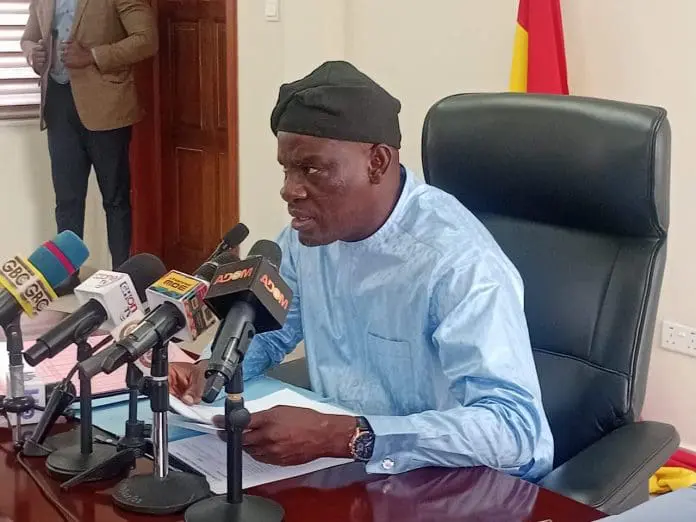By Ashiadey Dotse,Ghana News
Copyright ghananewss

Education Minister Haruna Iddrisu has committed up to GH₵1 billion for expanding school infrastructure nationwide while announcing a 50% increase in book and research allowance for tertiary educators, signaling government’s intent to address long-standing challenges in Ghana’s education sector.
Speaking at the University Teachers Association of Ghana (UTAG)’s 22nd Biennial Congress in Aburi on Monday, September 30, Iddrisu revealed he’d requested GH₵300 million from the Finance Ministry specifically for Category ‘A’ senior high schools experiencing capacity constraints.
But he was quick to clarify that elite schools wouldn’t monopolize resources. “While spending GH₵300 million on Category ‘A’ schools, I’ll commit GH₵500 million to GH₵1 billion to other infrastructure across the country,” the Minister stated, emphasizing equitable distribution of educational investments.
The announcement comes as Ghana grapples with intense competition for limited spaces in prestigious secondary schools. Parents increasingly express frustration over the computerized placement system that often assigns their wards to schools far from their preferred choices, particularly the coveted Category ‘A’ institutions.
Iddrisu acknowledged this tension directly. “All of us want our wards in the best schools, justifiably so. But are we investing in expanding infrastructure in the Category ‘A’ schools?” he asked the assembled academics.
His response suggests the government recognizes that simply maintaining current infrastructure won’t address surging demand. Expanding facilities at elite schools while simultaneously upgrading other institutions represents an attempt to balance parental aspirations with equitable national investment.
On research funding, Iddrisu announced that government has raised the book and research allowance from GH₵408 million to GH₵610 million for the 2025 fiscal year. “We will honour book and research allowance,” he affirmed, drawing applause from UTAG members who’ve long pressed for adequate research support.
The 50% increase represents a significant boost for Ghana’s tertiary education sector, where inadequate research funding has historically constrained academic productivity. University lecturers frequently cite insufficient resources for conducting research, purchasing books, and attending conferences—activities essential for maintaining academic standards.
This latest commitment builds on earlier announcements from Iddrisu’s tenure. Two weeks ago, he disclosed that the Ghana Education Trust Fund (GETFund) would inject GH₵1 billion into school infrastructure in 2026, aimed at tackling deficits and eventually phasing out the double-track system that has students alternating attendance schedules due to capacity constraints.
The double-track system, introduced under the previous administration’s Free Senior High School policy, allowed schools to accommodate more students than their physical infrastructure could handle simultaneously. While it expanded access, the arrangement has faced criticism for reducing instructional time and complicating school administration.
Iddrisu has also announced plans to recruit 93,000 personnel across the education sector, addressing severe staff shortages. That recruitment drive, combined with infrastructure expansion, suggests the government sees education investment as central to its broader development agenda.
The UTAG Congress, themed “Rethinking Higher Education Pedagogy and Funding in the Age of AI: Ethics, Equity and Development Impact,” brought together academics, policymakers, and education stakeholders to deliberate on higher learning’s future amidst technological disruption.
Artificial intelligence’s rapid advancement poses both opportunities and challenges for Ghana’s universities. Educators must prepare students for jobs that may not yet exist while ensuring ethical frameworks guide technology adoption. The funding increases Iddrisu announced could support research into how Ghana’s higher education institutions navigate these changes.
The Minister also used the platform to commend UTAG for its strong stance against illegal mining, commonly called galamsey. With the association considering strike action over environmental degradation threatening Ghana’s water bodies and forests, Iddrisu’s praise acknowledged academics’ role in national advocacy beyond campus boundaries.
UTAG has been vocal in demanding government action against galamsey, which has devastated river systems and farmlands across Ghana. The union’s threat to strike over the issue reflects growing frustration among educators who see environmental destruction undermining Ghana’s long-term prospects.
Whether the announced funding commitments will materialize fully remains to be seen. Ghana’s fiscal constraints are well-documented, and education sector promises have historically faced implementation challenges. The GH₵300 million for Category ‘A’ schools still requires Finance Ministry approval, Iddrisu acknowledged.
The broader GH₵1 billion commitment spans multiple years and funding sources, including GETFund allocations. How quickly these resources translate into actual classroom blocks, laboratories, and dormitories will determine whether the announcement represents genuine transformation or merely political messaging.
For UTAG members, the research allowance increase offers more immediate relief. Universities can begin planning for enhanced research activities based on the confirmed GH₵610 million allocation for 2025. That funding should support book purchases, conference participation, and research projects that have languished due to resource constraints.
The infrastructure commitments, if executed, could reshape Ghana’s secondary education landscape. Expanding Category ‘A’ school capacity might reduce the intense competition that currently defines admissions to these institutions. Simultaneously upgrading other schools could narrow quality gaps that drive the elite school obsession among parents.
Iddrisu’s emphasis on balanced investment suggests awareness that concentrating resources on already-advantaged schools risks deepening educational inequality. Ghana’s development requires not just excellent elite institutions but a broadly competent education system producing skilled graduates at scale.
The coming months will reveal whether these pledges translate into budget allocations, procurement processes, and ultimately, physical infrastructure. For now, the Minister has at least articulated a vision for substantial education sector investment aimed at addressing both capacity constraints and quality concerns.



